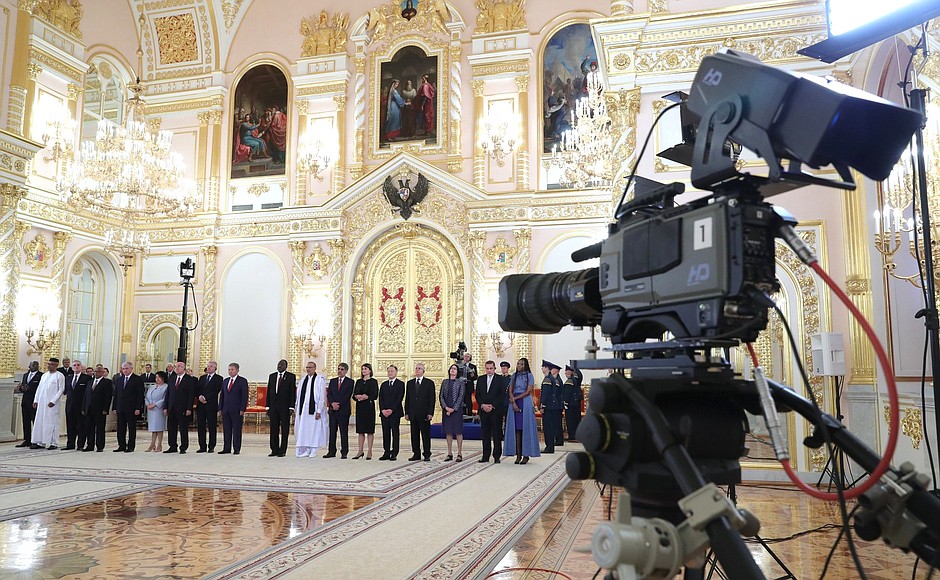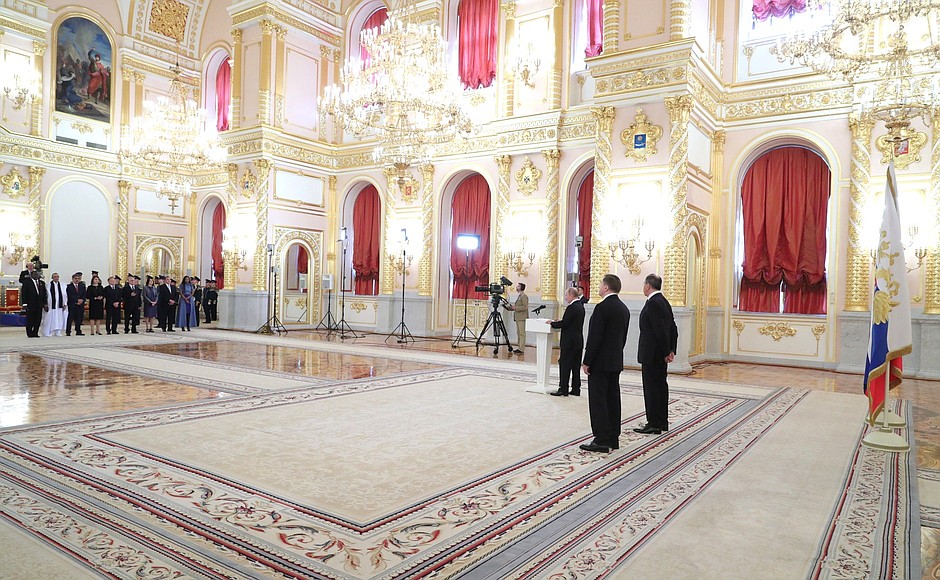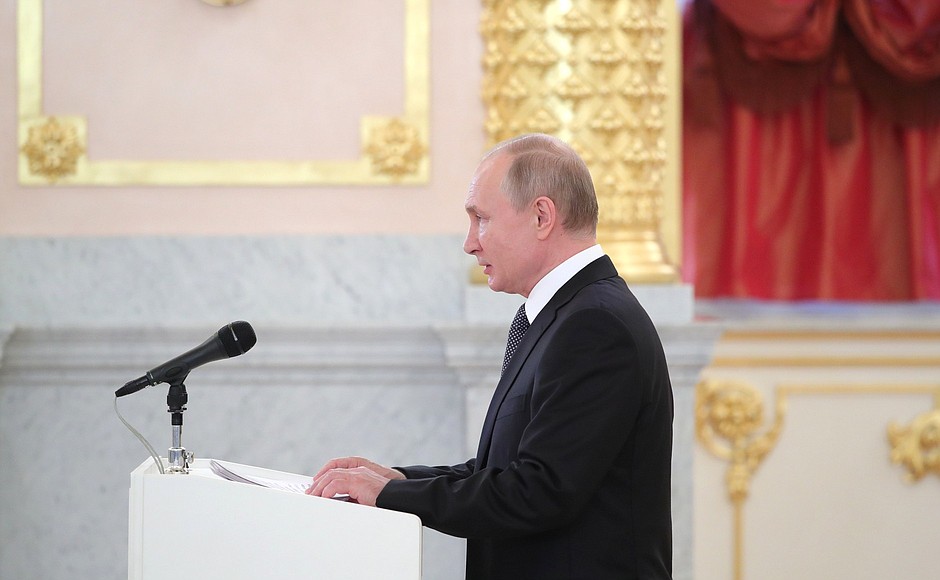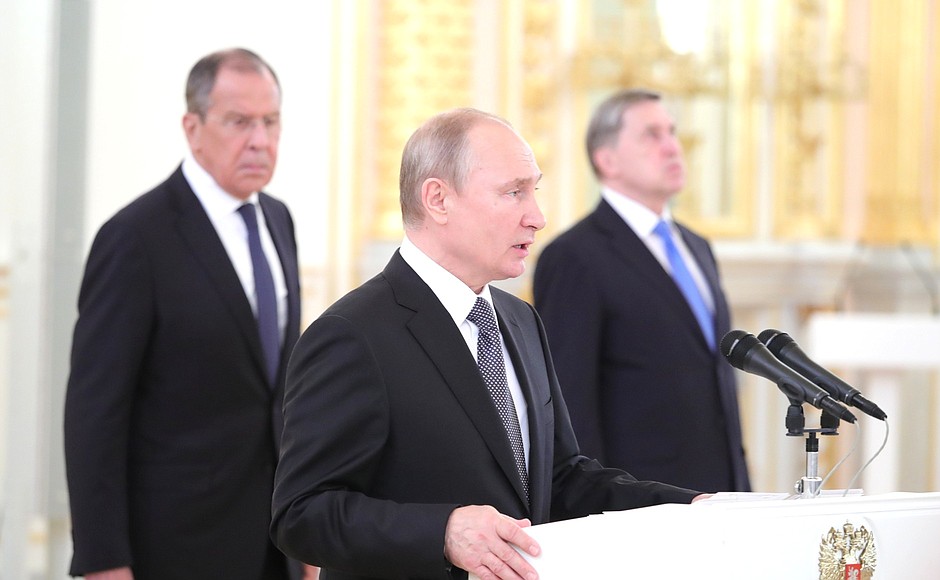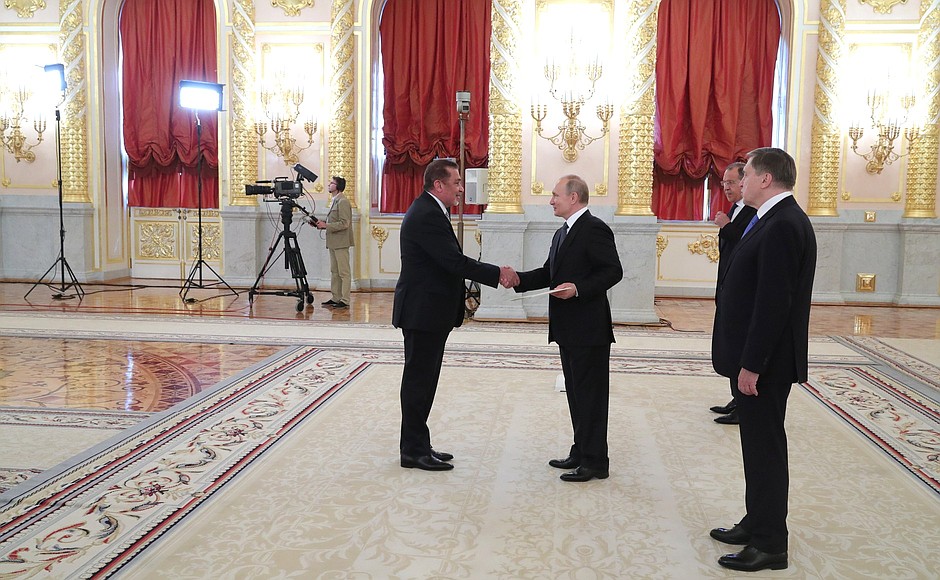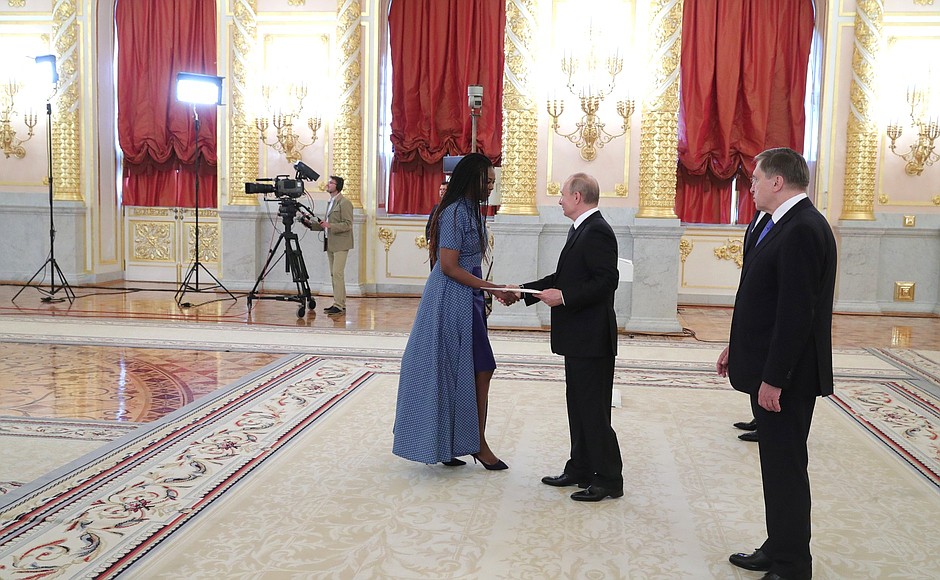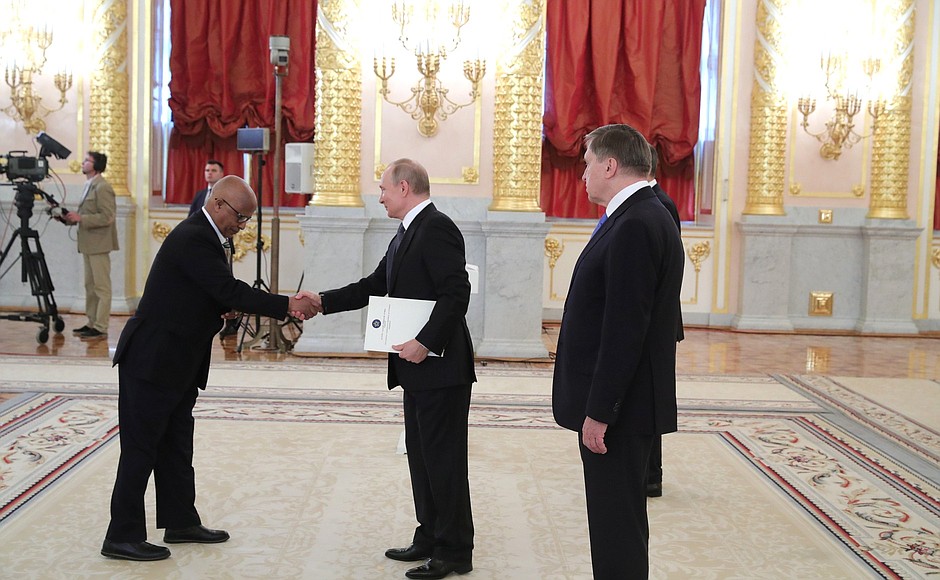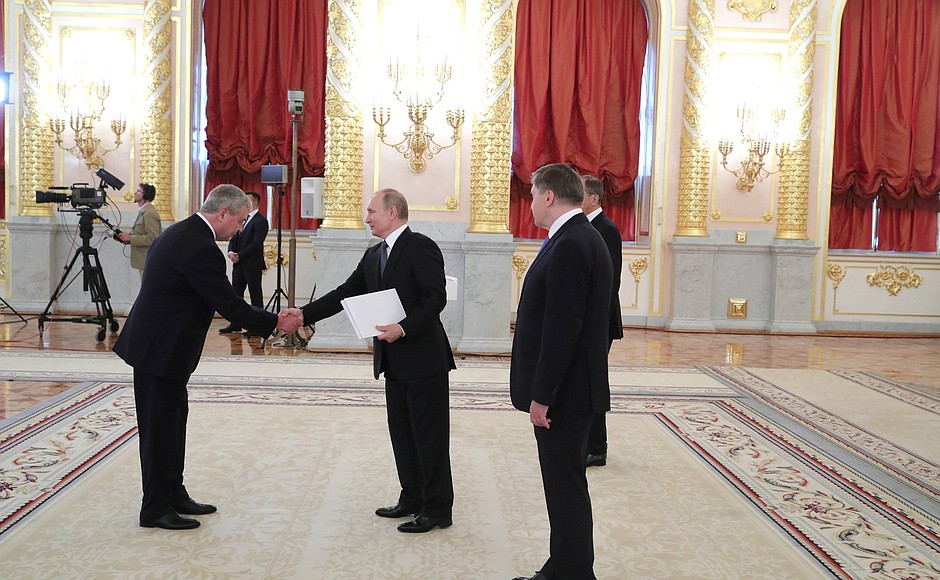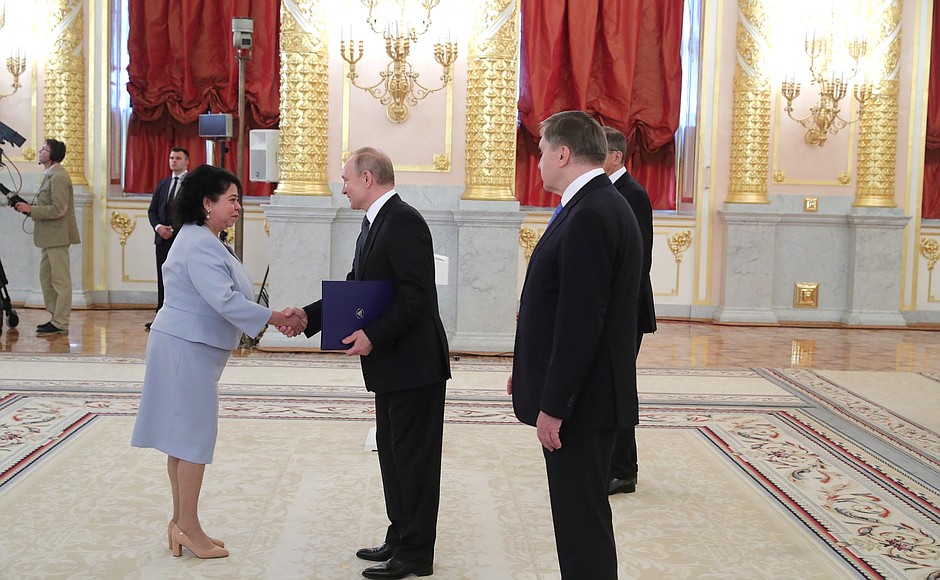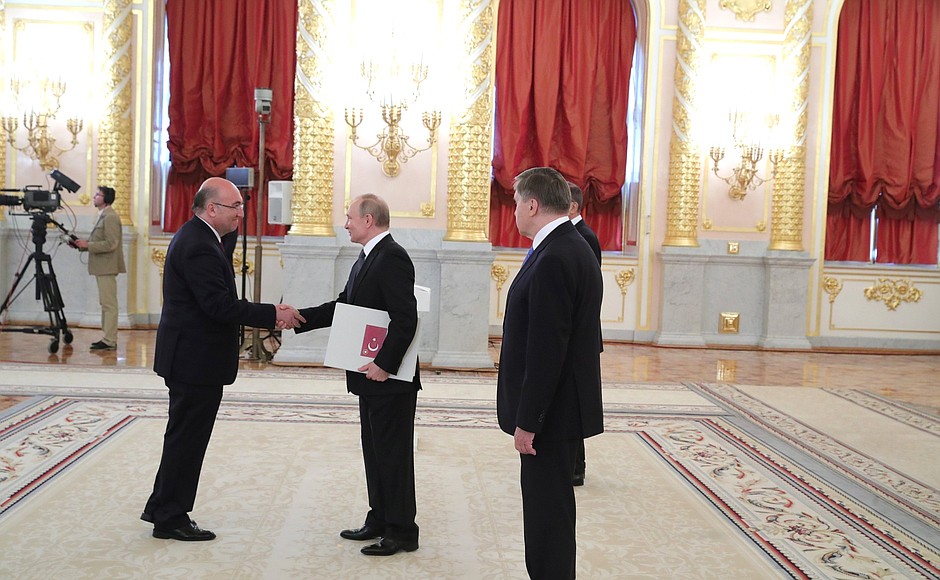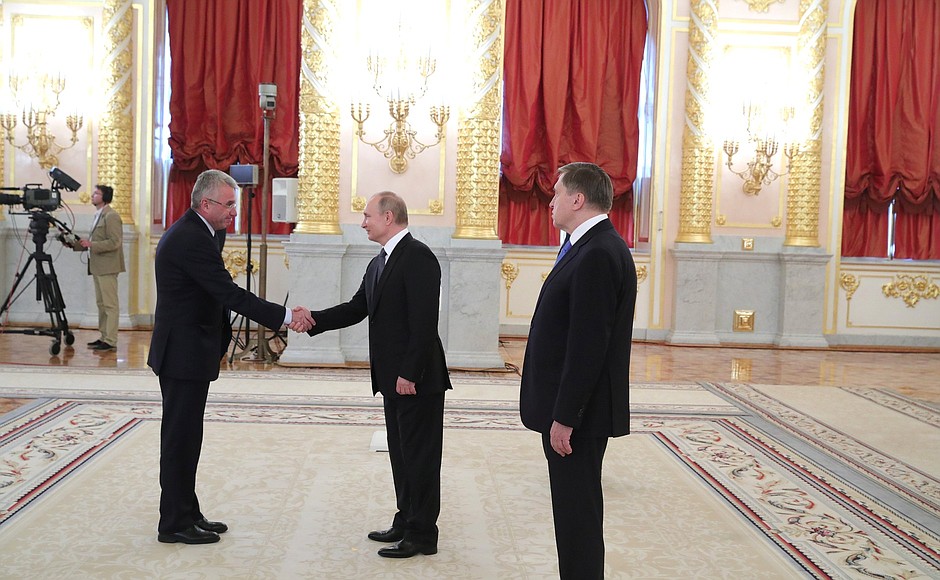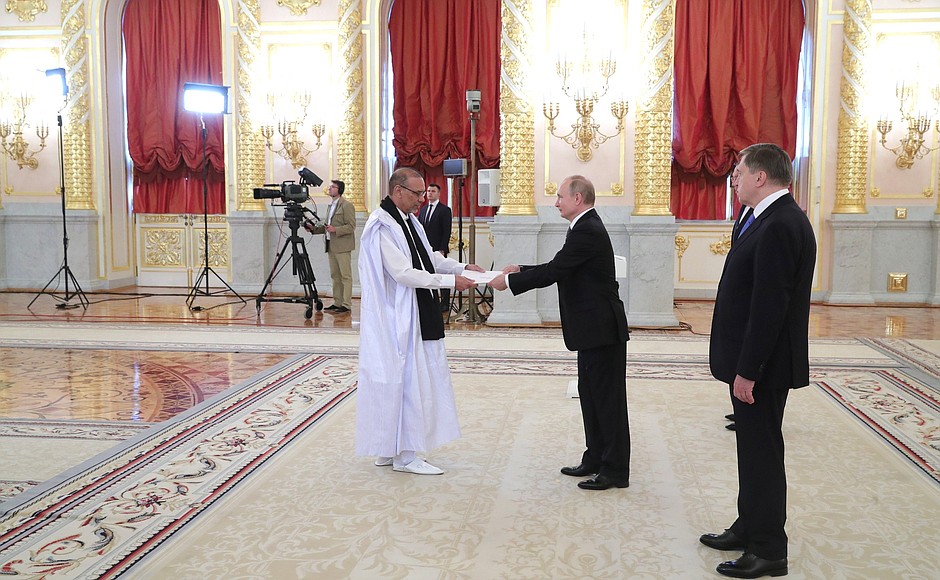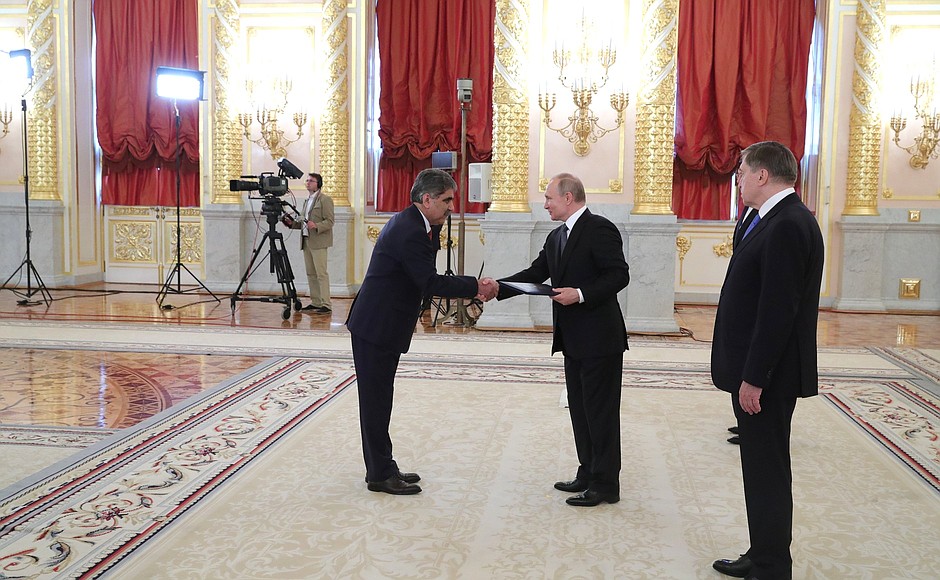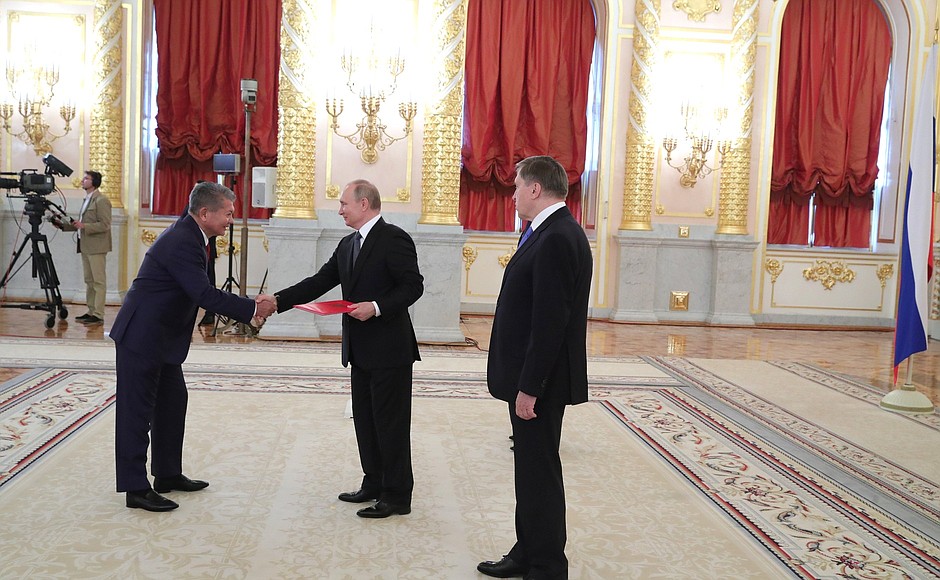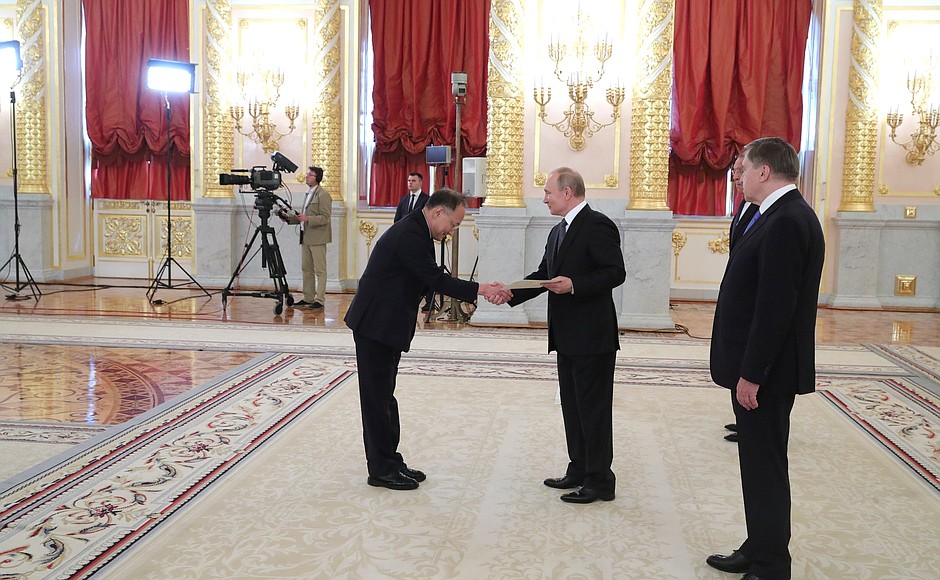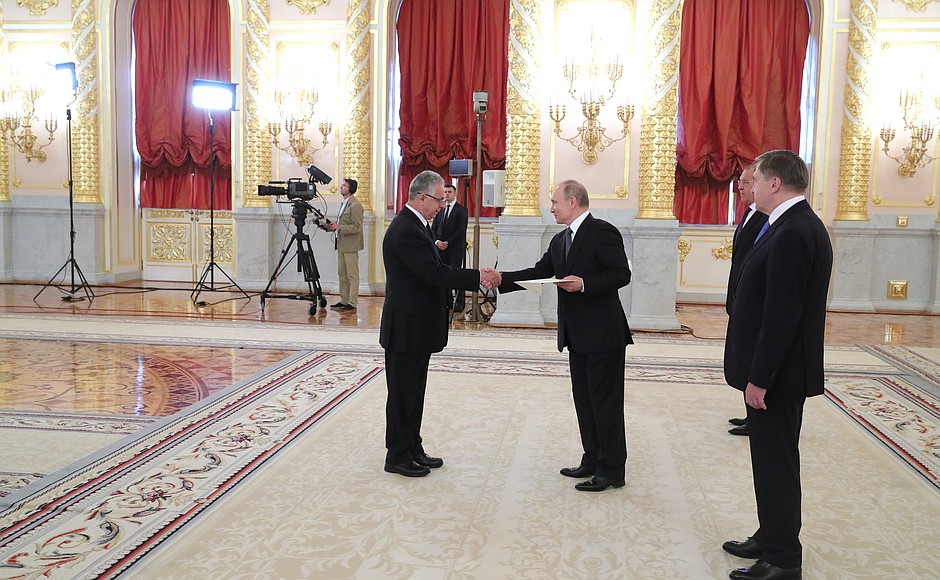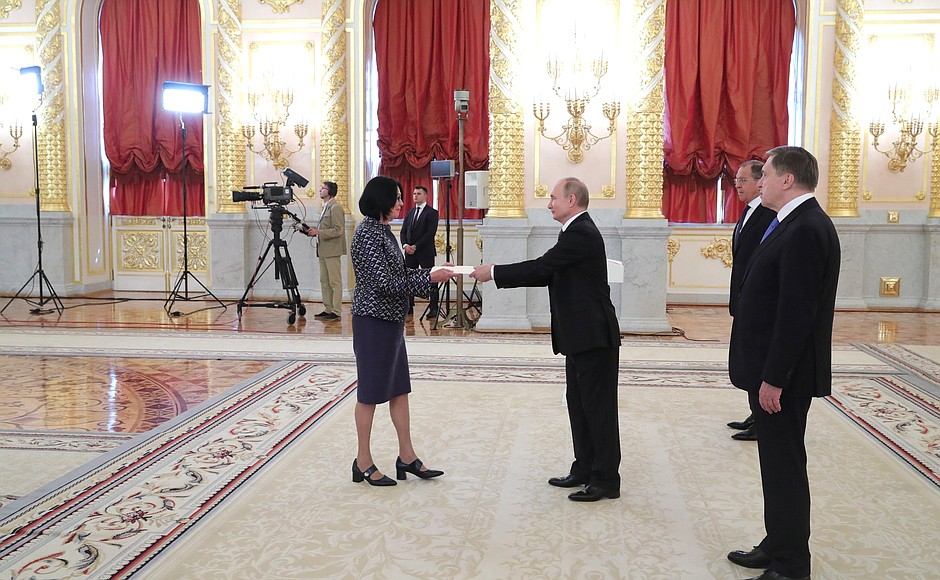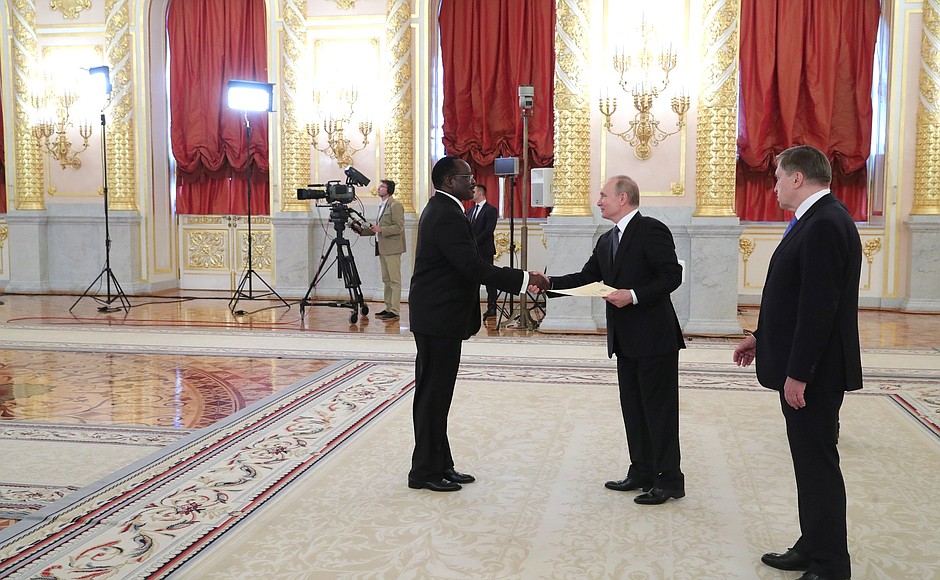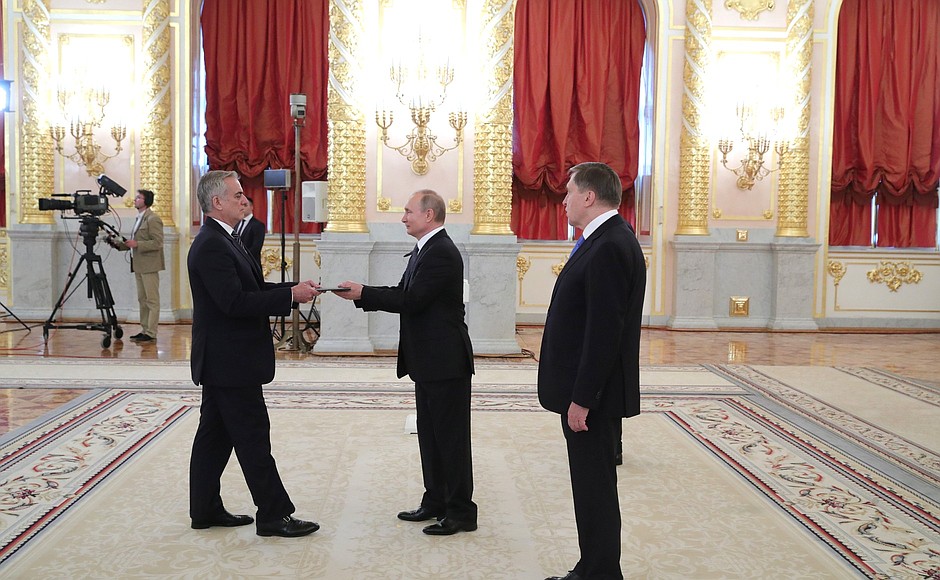Letters of credence were presented to the President of Russia by: Denis Kalume Numbi (Democratic Republic of the Congo), Mohamed Yongawo (Republic of Sierra Leone), Tovar da Silva Nunes (Federative Republic of Brazil), Alemayehu Tegenu Aargau (Federal Democratic Republic of Ethiopia), Vladimir Semashko (Republic of Belarus), Alba Azucena Torres Mejia (Republic of Nicaragua), Mehmet Samsar (Republic of Turkey), Tomislav Car (Republic of Croatia), Alibek Jekshenkulov (Kyrgyz Republic), Clemens Handuukeme Kashuupulwa (Republic of Namibia), Hamid Hamouni (Islamic Republic of Mauritania), Mohammad Latif Bahand (Islamic Republic of Afghanistan), Tasia Athanasiou (Hellenic Republic), Lee Sok-bae (Republic of Korea), Andreas Zenonos (Republic of Cyprus), Lilliam Rodriguez Jimenez (Republic of Costa Rica), Louis Sylvestre Radegonde (Republic of Seychelles), and Chandapiwa Nteta (Republic of Botswana).
* * *
President of Russia Vladimir Putin: Ladies and gentlemen, colleagues,
I am delighted to welcome you to the Kremlin for the presentation of your letters of credence. You have an important and responsible mission – to facilitate the development of relations between your states and Russia. I hope that you will remain devoted to your mission of promoting political dialogue, as well as economic, humanitarian and other ties between our nations.
We are wholeheartedly interested in the success of your efforts, and we will certainly provide all-round assistance to your positive initiatives.
Russia is open to mutually beneficial cooperation with all states without exception based on equality and respect for each other’s interests, non-interference in internal affairs and strict compliance with international law.
As a permanent member of the UN Security Council, Russia is making a contribution to the settlement of acute regional crises and other outstanding international problems.
We stand for equal and indivisible security and a fair system of international economic relations without unscrupulous competition and unilateral and politically driven sanctions and restrictions.
We are guided by these principles in our work at the UN and its specialised and regional agencies, as well as at other multilateral organisations, including G20, which has recently held its summit meeting in Osaka.
In the near future, Russia will host a series of major international events. In June, Russia assumed the presidency of the Shanghai Cooperation Organisation, and we will preside in BRICS from early 2020.
In July 2020, we will host summits of these two associations. We are preparing for them, we are steering towards a joint partnership, and we aim to advance common priorities in such areas as politics, security, economy, finance, culture and humanitarian ties.
In September 2019, Vladivostok will host a regular Eastern Economic Forum. We are expecting to receive Prime Minister of India Narendra Modi and Prime Minister of Japan Shinzo Abe as guests of honour.
We are planning to review cooperation prospects and the implementation of major joint investment projects in the Asia-Pacific region and to exchange opinions on ways of merging various integration processes so as to create a major Eurasian partnership.
In early October, Moscow will host Russian Energy Week, whose participants will discuss ensuring global energy security, providing all-round energy access and reducing volatile prices on global energy markets.
We are preparing actively for the Russia-Africa summit, which will take place in Russia for the first time. It will be held in late October in Sochi and will be preceded by the Russian-African Economic Forum. President of Egypt and incumbent Chairman of the African Union Abdel Fattah el-Sisi will co-chair the Sochi forum together with us.
We have sent invitations to all leaders of African states and to the heads of the largest sub-regional associations and organisations. We hope we will be able to take dialogue between Russia and Africa to an entirely new level, helping maintain regional peace and security, as well as sustainable development on the African continent.
We are certainly preparing for a grand celebration of the 75th anniversary of Victory over Nazism in WWII next May. There will be a large-scale programme of celebrations, and we hope the high representatives of many states will attend.
We are aware of the importance of carefully preserving the historical truth about this great event of the 20th century. We remember how much this victory cost, and we consider it necessary to always keep this in mind, and never forget the lessons of that terrible war.
Ladies and gentlemen,
The heads of 18 diplomatic missions are present here today. By tradition, I would like to say a few words about Russia’s relations with each of the states you represent.
We are interested in further developing cooperation with the Democratic Republic of the Congo in politics, trade, and international affairs. We will continue to assist our Congolese partners in improving the socioeconomic situation in their country.
Russia’s relations with Sierra Leone are based on the traditions of friendship and mutual understanding. We can see prospects for joint work in such sectors as mining, agriculture, and fishing.
Brazil is one of our key partners on the international stage. We are consistently building bilateral relations, and developing cooperation in the energy sector, in the field of innovation and high technology.
Brazil currently presides in BRICS, and only recently held a successful meeting of the BRICS leaders in Osaka. We will take part in the next, 11th BRICS summit in Brazil in November, after which, the rotating presidency will go to Russia.
We are satisfied with the level of cooperation with Ethiopia. Last year, our countries marked the 120th anniversary of diplomatic relations. Our bilateral dialogue covers a range of important political, economic, research and education topics. We will continue to strengthen cooperation in international and regional affairs.
Belarus is Russia’s closest ally. Taking this opportunity, I would like to once again congratulate the Belarusian people and the leadership of the republic on their national holiday, Independence Day. On this very day, July 3, 75 years ago, Minsk was liberated from Nazi invaders.
This year, numerous events are being held dedicated to the 20th anniversary of the Union State. We are committed to the further development of close integration with our Belarusian partners. This topic will be discussed at the talks with President of Belarus Alexander Lukashenko scheduled to take place on the sidelines of the 6th Forum of Regions of Belarus and Russia on July 18 in St Petersburg.
In December, we will celebrate the 75th anniversary of diplomatic relations with Nicaragua. Our countries share strong bonds of friendship and implement joint projects in healthcare, personnel training and disaster relief. We support the policy of this country’s leadership in regional and international affairs.
Partnership with our neighbour Turkey has reached a strategic level. We are in constant contact with President Recep Tayyip Erdogan. In April, Moscow hosted a productive meeting of the High-Level Russian-Turkish Cooperation Council.
We are successfully implementing such major projects as the construction of the Akkuyu nuclear power plant and the TurkStream gas pipeline. We also have many other interesting projects and joint ventures.
A significant factor in international stability is the coordinated efforts of Russia and Turkey to normalise the situation and launch the peace process in Syria.
There are good opportunities for the further development of trade, investment and cultural ties with Croatia. Recently, a series of fruitful top-level and high-level meetings has been held; inter-agency, inter-parliamentary and inter-regional exchanges are expanding.
We have a strategic partnership and allied relations with Kyrgyzstan. Our countries participate in the Eurasian integration processes, including close cooperation within the Eurasian Economic Union, and promote international and regional security through the CSTO.
The state visit to Kyrgyzstan in March gave a new impetus to trade, economic, military-technical, cultural and other cooperation.
Cooperation with Namibia is successfully developing in such sectors as mineral resource development and uranium mining, as well as in the energy, fisheries, agriculture, tourism, military-technical and cultural areas.
Namibia pursues a balanced policy in international affairs and plays an active role in peace-making efforts of the Southern African Development Community.
We work together with Mauritania in marine fishing and hydrocarbon production. Our Mauritanian partners make a significant contribution to the fight against terrorism in the Sahara-Sahel zone.
This year we celebrate the centennial of diplomatic relations with Afghanistan. We continue to assist in establishing a peaceful independent Afghan state, free from terrorism and drug-related crimes.
We advocate for an end to the armed conflict in Afghanistan and the launch of an inclusive dialogue involving a wide range of social and political forces.
We are planning to continue facilitating this process together with our Moscow format partners and the SCO-Afghanistan contact group.
Russia and Greece are linked by deep spiritual and historical ties. This year, our countries are holding the Cross Year of Language and Literature, and we are ready for further cooperation in virtually every area.
Relations with the Republic of Korea are rapidly advancing. Next year, we will celebrate the 30th anniversary of our diplomatic relations. Russia and South Korea are currently implementing large-scale joint trade and investment projects.
We work closely on the situation on the Korean peninsula and advocate for its prompt settlement through political and diplomatic means. We recently talked about this with President Moon Jae-in at the G20 Summit in Japan.
We maintain close political, cultural and spiritual ties with the Republic of Cyprus. It is a favourite holiday spot for Russian citizens; last year, over 800,000 Russians visited Cyprus resorts.
Russia consistently advocates for a comprehensive, just and viable settlement of the Cyprus problem based on the relevant UN Security Council resolutions.
We are interested in cooperating with Costa Rica in the trade, economic and cultural areas. This May, we celebrated the 75th anniversary of diplomatic relations between our countries. Our agreement on visa-free travel has recently entered into force.
We maintain friendly relations with the Republic of Seychelles. We count on further joint work to expand our cooperation, including in tourism.
Relations with Botswana encompass the trade, economic and humanitarian spheres; the intergovernmental agreement on military-technical cooperation is currently in force. Last year, we signed an intergovernmental agreement on cooperation in defence.
Ladies and gentlemen,
In conclusion, I would like to once again wish you all success in your important mission. I hope that your time in Russia will help you get to know our country better, get a better understanding of its people, and learn more about Russian history and culture. I am sure that it will leave the best of impressions on you.
Thank you for your attention. Good luck!
